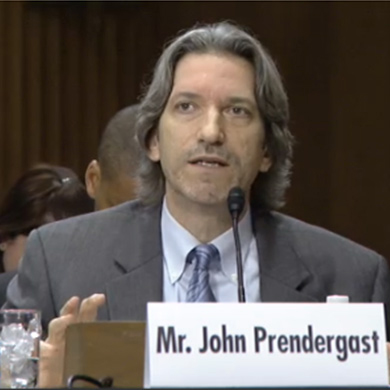
Ten years after the height of the genocide in Darfur, the humanitarian situation in Sudan remains dire. State-sponsored violence and human rights abuse run rampant throughout the country and an estimated 200,000 Darfuris have been displaced since the beginning of 2013. The government of Sudan’s aerial bombardment of civilians in South Kordofan and Blue Nile states and blockade of humanitarian relief has also created a crisis nearing famine conditions.
On June 19, John Prendergast testified before the Tom Lantos Human Rights Commission on the humanitarian crisis in the Sudans. Other expert witnesses included Larry Andre of the Office of the Special Envoy for Sudan and South Sudan at the Bureau of African Affairs, Nancy E. Lindborg of the U.S. Agency for International Development, Ken Isaacs of Samaritan’s Purse, E.J. Hogendoorn of International Crisis Group, and Jehanne Henry of Human Rights Watch.
During the hearing, commission member Representative Wolf was candid in his statements on war criminal Nafie al Nafie’s postponed visit to the U.S: “To have this guy visit is immoral. It’s wrong.” Wolf also emphasized the need for the administration to appoint a credible Special Envoy on Sudan and South Sudan.
John Prendergast recommended that the U.S. focus expanded aid and diplomatic assets on by:
- Promoting comprehensive peace. The U.S. should help construct a comprehensive peace process for all of Sudan rather than promote the regional peace deals like the current Darfur initiative. The U.S. should also recognize opposition coalitions such as the Sudan Revolutionary Front, or SRF, as the key to a peaceful transition.
- Supporting media tools and countering the state monopoly on access to the media. This initiative would involve assisting opposition, civil society, and Sudanese journalists.
- Assisting democratic governance by supporting rebels’ capacity to deliver humanitarian aid and create civil administrative capacities.
- Enhancing coalition-building by assisting the efforts of Sudanese civil society, rebels, and political opposition in building deeper partnerships regarding their visions for political transition in Sudan.
- Building institutional capacities for SRF, National Consensus Forces, youth, and civil society groups working for democratic change.
In his closing remarks, Prendergast emphasized that political constituency in the U.S. matters in the fight against genocide. It is vital to once again use political will to force policy makers to address the ongoing human rights abuses in Sudan. Help put Sudan back on the map.
Watch the full hearing here.

